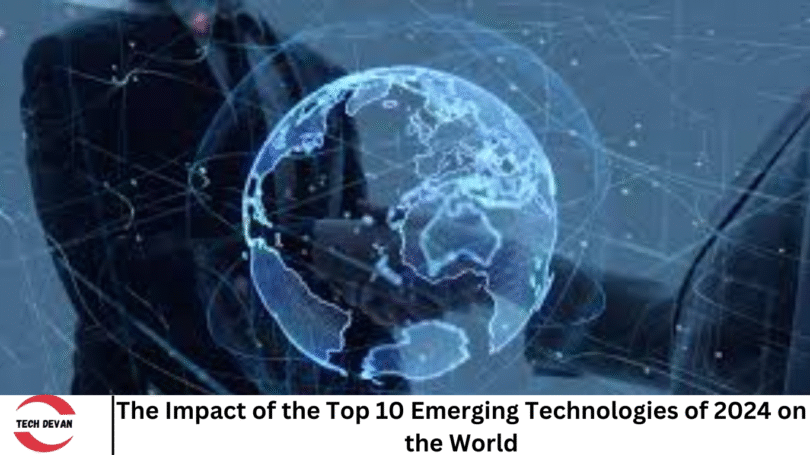Technology evolves at lightning speed, staying ahead of emerging innovations is crucial for leaders, entrepreneurs, and citizens alike. The World Economic Forum’s Top 10 Emerging Technologies of 2024 report, produced in collaboration with Frontiers, has highlighted a range of groundbreaking technologies poised to transform industries and tackle global challenges.
As we look toward the future, it’s clear that these advancements will have far-reaching implications across sectors like healthcare, energy, manufacturing, and beyond. In this article, we will explore the top emerging technologies of 2024 and discuss how they will shape the world in the years to come.
More Read: Redefining the Digital Frontier: The Rise and Impact of Edge Computing
1. Quantum Computing: Revolutionizing Data Processing
Quantum computing is set to revolutionize how we process data. Unlike traditional computers that rely on bits as the smallest unit of data, quantum computers use qubits, which can represent and store information in multiple states simultaneously. This capability allows quantum computers to solve complex problems exponentially faster than their classical counterparts.
Potential Impact on Industries
Quantum computing has the potential to accelerate advancements in fields such as cryptography, drug discovery, and artificial intelligence (AI). In the financial sector, quantum algorithms could improve risk analysis and fraud detection by processing vast amounts of data more efficiently. In healthcare, quantum simulations could speed up the development of new treatments and vaccines, addressing critical challenges like antimicrobial resistance.
While quantum computing is still in its infancy, its impact on the global economy could be immense. Industries that embrace quantum technology early will likely gain a competitive edge, positioning themselves as leaders in innovation.
2. Artificial Intelligence (AI) in Healthcare: Revolutionizing Diagnosis and Treatment
Artificial intelligence has already begun to make significant strides in healthcare, but the emerging technologies of 2024 will take AI’s role in the field to new heights. From AI-powered diagnostic tools to personalized treatment plans, these innovations will enable faster, more accurate healthcare services, improving patient outcomes worldwide.
AI-Powered Diagnostics
AI systems can analyze vast amounts of medical data, including patient records, imaging, and genetic information, to identify patterns that may go unnoticed by human doctors. AI can help detect diseases like cancer, heart conditions, and neurological disorders at earlier stages, allowing for earlier intervention and better prognoses.
Personalized Medicine
AI’s ability to analyze genetic and molecular data is driving the development of personalized treatments tailored to an individual’s specific needs. By understanding a patient’s unique genetic makeup, doctors can create more effective treatment plans with fewer side effects. Personalized medicine is set to be a cornerstone of future healthcare systems, making treatments more efficient and accessible.
3. Biotechnology and Gene Editing: Transforming Medicine and Agriculture
Biotechnology is an area that continues to evolve at a rapid pace, with gene editing technologies such as CRISPR offering unprecedented potential. These tools allow scientists to edit the genetic code of living organisms with incredible precision, opening doors for innovations in both medicine and agriculture.
Gene Editing for Disease Treatment
In healthcare, CRISPR and other gene-editing technologies hold the promise of curing genetic diseases by correcting faulty genes. Diseases like sickle cell anemia, muscular dystrophy, and cystic fibrosis could be treated at their genetic roots, dramatically improving the quality of life for millions.
Agricultural Advancements
In agriculture, gene editing can be used to create crops that are more resistant to disease, pests, and environmental stressors. This could revolutionize food production, ensuring greater food security as the global population continues to rise. By enabling more efficient and sustainable farming practices, gene editing could help tackle global challenges such as hunger and climate change.
4. 5G and Beyond: The Future of Connectivity
The rollout of 5G networks is already underway, but the advancements we can expect in the coming years will take connectivity to a whole new level. 5G offers ultra-fast internet speeds, lower latency, and the ability to support a massive number of connected devices, all of which will be essential as we move toward a more interconnected world.
Impact on Industries
With 5G’s enhanced connectivity, industries like manufacturing, healthcare, and transportation will benefit from real-time data sharing and automation. In manufacturing, for example, 5G will enable smarter factories with greater operational efficiency. In healthcare, remote surgeries and telemedicine will become more reliable, bringing high-quality care to underserved regions.
The Path to 6G
As 5G continues to roll out, the race to develop 6G has already begun. Expected to be deployed in the 2030s, 6G will offer even faster speeds, ultra-low latency, and even greater connectivity, enabling innovations like fully autonomous vehicles, virtual reality (VR) experiences, and advanced smart cities.
5. Energy Storage Solutions: Advancing Clean Energy Adoption
The transition to renewable energy is one of the most pressing global challenges of our time. While wind and solar energy are crucial to reducing greenhouse gas emissions, they are intermittent sources, meaning energy must be stored for use when generation is low. Emerging energy storage solutions are key to addressing this challenge.
Breakthroughs in Battery Technology
Solid-state batteries, flow batteries, and other next-generation energy storage technologies are set to revolutionize the renewable energy sector. These innovations promise higher energy densities, faster charging times, and greater safety compared to traditional lithium-ion batteries, making them ideal for both electric vehicles and large-scale energy storage.
Impact on Clean Energy
By improving the storage and efficiency of renewable energy sources, these technologies will accelerate the global shift to clean energy, reducing reliance on fossil fuels and mitigating the impacts of climate change. As energy storage costs decrease and technologies scale, renewable energy will become increasingly accessible worldwide.
6. Blockchain and Decentralized Finance (DeFi): Reshaping Finance and Supply Chains
Blockchain technology, known for its association with cryptocurrencies like Bitcoin, is expanding its reach beyond digital currencies. In 2024, blockchain is poised to have a profound impact on industries ranging from finance to supply chain management.
Decentralized Finance (DeFi)
DeFi is a rapidly growing sector within the blockchain space that uses blockchain technology to provide financial services without traditional intermediaries like banks. DeFi platforms enable peer-to-peer lending, borrowing, and trading, offering greater accessibility and financial inclusion for people around the world.
Supply Chain Transparency
Blockchain can also improve transparency and traceability in supply chains, allowing consumers and businesses to verify the origins of goods. This technology will play a vital role in improving sustainability, reducing fraud, and enhancing accountability in industries like agriculture, manufacturing, and pharmaceuticals.
7. Autonomous Vehicles: Shaping the Future of Transportation
The development of autonomous vehicles (AVs) has the potential to reshape the global transportation landscape. With advancements in AI, machine learning, and sensor technologies, AVs are becoming increasingly capable of navigating roads without human intervention.
Transforming Transportation
Autonomous vehicles will revolutionize how we commute, deliver goods, and transport people. In cities, AVs could reduce traffic congestion and accidents, improving overall road safety. In logistics, self-driving trucks and drones could streamline supply chains, reducing costs and improving efficiency.
Environmental Impact
AVs also have the potential to reduce emissions by optimizing driving patterns and increasing the adoption of electric vehicles. As a result, autonomous transportation systems could play a significant role in the transition to a more sustainable future.
8. Synthetic Biology: Designing Life to Address Global Challenges
Synthetic biology is an interdisciplinary field that combines biology, engineering, and computer science to design new biological systems. By creating organisms with tailored capabilities, synthetic biology is opening doors to innovative solutions for global problems.
Medical and Environmental Applications
In healthcare, synthetic biology could lead to the development of new therapies, vaccines, and diagnostic tools. In agriculture, synthetic organisms could be engineered to help solve issues like food scarcity and environmental degradation. The potential applications of synthetic biology are vast and could have a transformative impact on industries like biotechnology, environmental conservation, and food security.
9. Metaverse and Virtual Reality (VR): Creating New Realities
The metaverse, an immersive virtual world powered by VR and augmented reality (AR), is gaining significant attention in 2024. This virtual universe promises to change the way we interact with the internet, work, socialize, and conduct business.
Impact on Work and Social Interaction
In the metaverse, virtual offices and collaboration spaces will allow employees to work from anywhere while interacting in immersive, 3D environments. This could make remote work more engaging and productive, especially for companies that have adopted hybrid or fully remote models.
Entertainment and E-Commerce
The metaverse will also disrupt industries like gaming, entertainment, and e-commerce. Brands will have new opportunities to engage with consumers in virtual spaces, offering experiences that blend reality with digital interaction.
10. Space Exploration and Commercialization: Expanding Humanity’s Reach
Space exploration continues to advance, and commercial space travel is becoming more accessible. Companies like SpaceX and Blue Origin are making it possible for private citizens to venture into space, while government agencies and private firms alike are working to establish a human presence on Mars.
Impact on Innovation and Economy
The commercialization of space could unlock new economic opportunities, from asteroid mining to space tourism. Additionally, advances in space technology could lead to innovations that benefit life on Earth, such as satellite-based communications, global positioning systems (GPS), and climate monitoring tools.
Frequently Asked Question
What are the top 10 emerging technologies of 2024?
The World Economic Forum’s Top 10 Emerging Technologies of 2024 highlights innovations poised to reshape industries and tackle global challenges. These include:
- Quantum Computing
- Artificial Intelligence (AI) in Healthcare
- Biotechnology and Gene Editing (e.g., CRISPR)
- 5G and Beyond (e.g., 6G)
- Energy Storage Solutions
- Blockchain and Decentralized Finance (DeFi)
- Autonomous Vehicles
- Synthetic Biology
- Metaverse and Virtual Reality (VR)
- Space Exploration and Commercialization
How will quantum computing impact industries?
Quantum computing will revolutionize industries by enabling faster and more efficient problem-solving than classical computers. In sectors like finance, healthcare, and logistics, quantum computing can speed up data analysis, enhance risk management, and facilitate breakthroughs in drug discovery. It is expected to transform industries that rely on large-scale computations, such as AI, cryptography, and materials science.
What role will artificial intelligence (AI) play in healthcare in 2024?
AI is set to revolutionize healthcare by enhancing diagnostics, treatment plans, and patient care. AI-powered tools can analyze medical data such as imaging and genetic information to detect diseases earlier and more accurately. Furthermore, AI is helping create personalized treatment plans, offering more effective and tailored healthcare solutions, and improving overall outcomes.
How will gene editing technologies like CRISPR affect medicine and agriculture?
Gene editing technologies like CRISPR will have a profound impact on medicine and agriculture. In medicine, CRISPR allows for the correction of genetic defects, offering potential cures for genetic diseases. In agriculture, it can be used to create crops that are resistant to diseases and environmental stress, improving food security and reducing reliance on harmful pesticides and chemicals.
5. What is the significance of 5G and beyond (6G) for global connectivity?
5G networks provide ultra-fast internet speeds, lower latency, and the ability to support more connected devices. This will enable advancements in fields like telemedicine, autonomous vehicles, and smart cities. As 5G becomes more widespread, the race toward 6G will further enhance connectivity, leading to even faster speeds and more immersive digital experiences, enabling new technologies like fully autonomous vehicles and virtual reality.
How will blockchain and decentralized finance (DeFi) reshape financial systems?
Blockchain and DeFi technologies are revolutionizing traditional finance by removing intermediaries, making financial services more accessible and transparent. DeFi platforms enable peer-to-peer lending, borrowing, and trading, democratizing financial opportunities. Blockchain’s secure, immutable ledger is also being applied to supply chain transparency, reducing fraud and increasing trust in industries like healthcare, agriculture, and manufacturing.
What are the potential environmental benefits of emerging technologies?
Emerging technologies have the potential to significantly benefit the environment. For example, advanced energy storage solutions like solid-state batteries will enhance renewable energy adoption by storing solar and wind energy more efficiently. Autonomous vehicles and AI-powered systems can optimize energy usage and reduce emissions. Moreover, innovations in biotechnology, such as gene-edited crops, can improve agricultural sustainability and food security while reducing the environmental footprint of traditional farming practices.
Conclusion
The Top 10 Emerging Technologies of 2024 represent the cutting edge of innovation, offering solutions to some of the world’s most pressing challenges. From quantum computing and AI in healthcare to renewable energy storage and autonomous vehicles, these technologies are set to transform industries, improve lives, and create new economic opportunities. For decision-makers, entrepreneurs, and citizens, understanding these technologies and their potential impacts is crucial for navigating the future. By embracing these innovations, society can harness the power of emerging technologies to drive progress, sustainability, and global well-being in the years to come.






Leave a Comment